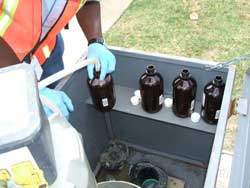The General Pretreatment Regulations under the Clean Water Act establish the overall framework for implementing an approved pretreatment program. The Regulations outline the minimum requirements which a Publicly Owned Treatment Works (POTW) must perform to satisfy the obligation established in its own Pollutant Discharge Elimination System (TPDES/NPDES) permit administered by the Environmental Protection Agency (EPA) and the Texas Commission on Environmental Quality (TCEQ). The Dallas Water Utilities is required by Section 403.8(f)(1)(v) of the Pretreatment Regulations to inspect and sample industrial users (IUs), and has the legal authority to:
"Carry out all inspection, surveillance and monitoring procedures necessary to determine, independent of information supplied by Industrial Users, compliance or noncompliance with applicable Pretreatment Standards and requirements. Representatives of the POTW shall be authorized to enter any premises of any Industrial User in which a discharge source or treatment system is located or in which records are required to be kept ... to assure compliance with Pretreatment Standards."

The Pretreatment Program staff carry out these requirements and conduct facility inspections, surveillance, and monitoring of industrial wastewater sources discharging to the City's wastewater collection system and treatment plants. The monitoring and inspections are performed in order to independently verify compliance with all applicable pretreatment standards. Monitoring/sampling of industrial discharges is performed according to 40 CFR 136.3(e) . Inspections are conducted at facilities that may have a potential to impact the wastewater collection system. The purpose and objective of the compliance monitoring program (including inspections and sampling) are to:
- Determine compliance with pretreatment permit conditions or The Dallas City Code Volume II, Chapter 49, Section 49-43 provisions;
- Support enforcement actions taken by the City of Dallas against noncompliant IUs;
- Generate data which can be used by Dallas Water Utilities in its annual report to the TCEQ and EPA;
- Ensure that self-monitoring data from the IU are complete, accurate and representative;
- Determine if the IU has corrected problems identified in the previous inspection;
- Evaluate Best Management Practices and pollution prevention measures;
- Identify IUs which influence the quality of the POTW's influent, effluent, and sludge quality;
- Evaluate the impacts of the POTW's influent on its treatment processes and the receiving stream;
- Evaluate, the need for revised local limits;
- Inform the regulated community of pretreatment requirements;
- Maintain current data on each regulated industrial user;
- Evaluate the adequacy of the IU's operation and maintenance activities on its pretreatment system;
- Assess the potential for spills and slug discharges;
- Evaluate the effectiveness of slug discharge control measures;
- Gather information for IU permit development;
- Evaluate the adequacy of the IU's hazardous waste management and disposal; and
- Determine potential problems with other statutes or regulations (e.g. RCRA ).
Inspection and Monitoring Frequencies
The operations and activities that occur at the industrial user will determine the frequency and type of inspections conducted at the facility. For example:
- Inspections of Significant Industrial User facilities (both Categorical and Non-Categorical) may be conducted at any time during the pretreatment year and may be either scheduled or unannounced. At a minimum all SIUs are inspected annually.
- Unannounced sampling of wastewater discharge is conducted at least once during each semi-annual period from January to June and July to December. In addition, the SIU may choose to conduct additional self monitoring.
- Non-Significant Industrial Users may be inspected and monitored yearly for surcharge and billing assessments.
- Restaurants and liquid waste generators may be inspected periodically to ensure compliance with the Dallas City Code.
- Remediation/groundwater discharge sites may conduct self monitoring as requested by the City.
- Liquid waste transporters are inspected yearly.
- Photo-processing, commercial and diagnostic imaging facilities may conduct self monitoring and inspections if they are participating in the Silver Best Management Practices program.
Inspection and monitoring may also be a part of an investigation initiated subsequent to reports of suspicious activity, illegal dumping, or service interruptions. If you have any questions about any suspicious discharge to the sanitary sewer, please contact the DWU Pretreatment Program .